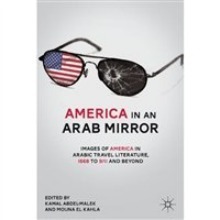The Reverse Orientalist: Kamal Abdel-Malek’s Writing Life Interview
 When Kamal Abdel-Malek was a young student, he chose to study outside the Arab world, eventually becoming a professor at Brown and Princeton Universities in the US. It was the first step in the physical and intellectual journeys of this intriguing Egyptian writer. Born in Alexandria and now a teacher of Arabic literature at the American University in Dubai, Abdel-Malek’s latest publication (available in English) is perhaps his most important, because it answers many of the questions Westerners asked themselves about the Arab world since the 9/11 attacks almost a decade ago. Abdel-Malek’s technique is an unusual and compelling one, because instead of seeking to explain how Arabs are, in America in an Arab Mirror: Images of America in Arabic Travel Literature, 1668 to 9/11 and Beyond he shows how we look to them. It’s a reversal of what the Palestinian intellectual Edward Said noted in Westerners writing about the Middle East: When you read the perceptions of Arab writers about Western society, it shows as much about the Arab writer as it does about the country he’s observing. Kamal took time to explain more about this vitally important book and to talk about his life as a writer. Demonstrating his originality as a thinker, he’s also the first writer I’ve interviewed on this blog to give due credit to Dan Brown.
When Kamal Abdel-Malek was a young student, he chose to study outside the Arab world, eventually becoming a professor at Brown and Princeton Universities in the US. It was the first step in the physical and intellectual journeys of this intriguing Egyptian writer. Born in Alexandria and now a teacher of Arabic literature at the American University in Dubai, Abdel-Malek’s latest publication (available in English) is perhaps his most important, because it answers many of the questions Westerners asked themselves about the Arab world since the 9/11 attacks almost a decade ago. Abdel-Malek’s technique is an unusual and compelling one, because instead of seeking to explain how Arabs are, in America in an Arab Mirror: Images of America in Arabic Travel Literature, 1668 to 9/11 and Beyond he shows how we look to them. It’s a reversal of what the Palestinian intellectual Edward Said noted in Westerners writing about the Middle East: When you read the perceptions of Arab writers about Western society, it shows as much about the Arab writer as it does about the country he’s observing. Kamal took time to explain more about this vitally important book and to talk about his life as a writer. Demonstrating his originality as a thinker, he’s also the first writer I’ve interviewed on this blog to give due credit to Dan Brown.How long did it take you to get your latest book published?
Two years. America in an Arab Mirror was published in April by Palgrave Macmillan in New York.
Would you recommend any books on writing?
Yes, books like these are helpful: On Writing by Stephen King, Break into Fiction, First Draft by Buckham and Love, and of course the classic, The Elements of Style by Strunk and White.
What’s a typical writing day?
I teach during the day so the only time available is either early in the morning or late in the evening. The best time is in the morning, especially when I wake up after a good night sleep.

Plug your book. How would you describe what it’s about? And of course why’s it so great?
America in an Arab Mirror: Images of America in Arabic Travel Literature, 1668 to 9/11 and Beyond deals with Arab-American relations, cross-cultural communication, and cultural understanding in general. The New York Times published a good review of it on April 21, 2011. My interest in Arab-American encounters in history, literature, and the arts started over a decade ago. The accounts of Arab travelers to America have always fascinated me. I widely researched the topic and had opportunities to read papers on it at Princeton and Dartmouth where I greatly benefited from the comments and the questions posed by colleagues in the field of Arabic and Middle Eastern studies. A question that was raised by a Princeton Arabist after one of my talks on the topic was whether Arab writings on America could be regarded as a case of Occidentalism, a counter-Orientalism of sorts. In some ways this book is a reversal of what Edward Said described as the West’s Orientalist view of the East. One could say that its stories are an Arab way of saying, “We, too, can subjugate you, Westerners, to our tourist, voyeuristic gaze.”
What’s your favorite sentence in all literature, and why?
If the question is about “favorite lines” instead of “favorite sentence” then I would mention, without hesitation, the evocative lines uttered by Macbeth upon receiving the news of his wife’s death.
Life's but a walking shadow, a poor player,
That struts and frets his hour upon the stage,
And then is heard no more. It is a tale
Told by an idiot, full of sound and fury,
Signifying nothing.
Macbeth Act 5, scene 5
What’s the best descriptive image in all literature?
But let there be spaces in your togetherness and let the winds of the heavens dance between you. Love one another but make not a bond of love: let it rather be a moving sea between the shores of your souls. -- Khalil Gibran
The teacher who is indeed wise does not bid you to enter the house of his wisdom but rather leads you to the threshold of your mind. -- Khalil Gibran
Who’s the greatest stylist currently writing?
In Arabic I must mention Yusuf Idris, the greatest short story writer and playwright. In Arabic he employs the different register of modern Arabic and the very evocative expressions of the everyday spoken Egyptian colloquial. In my opinion he, not Naguib Mahfouz, should have received the Nobel Prize for Literature. Outside the Arab world one can mention Gabriel García Márquez.
Read the rest of this post on my blog The Man of Twists and Turns.
Published on May 08, 2011 06:38
•
Tags:
9-11, america-in-an-arab-mirror, arab-world, arab-writers, egypt, egyptian-writer, interviews, kamal-abdel-malek, middle-east, writers, writing-life
No comments have been added yet.



